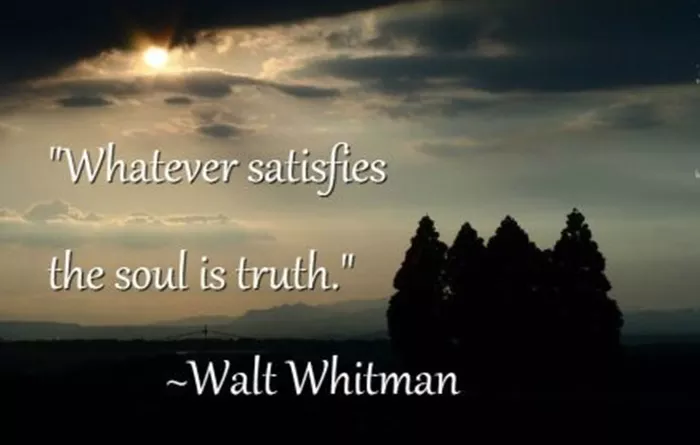Welcome to Poem of the Day – As At Thy Portals Also Death by Walt Whitman.
Walt Whitman, one of the most prominent American poets of the 19th century, often explored themes of life, death, and the human experience in his poetry. His work is characterized by free verse, a disregard for conventional forms, and an emphasis on individuality and unity. One of his poems, “As At Thy Portals Also Death”, delves into the idea of death as an inevitable yet integral part of life. In this article, we will explore the meaning and significance of this poem.
As At Thy Portals Also Death Poem
AS at thy portals also death,
Entering thy sovereign, dim, illimitable grounds,
To memories of my mother, to the divine blending, maternity,
To her, buried and gone, yet buried not, gone not from me,
(I see again the calm benignant face fresh and beautiful still,
I sit by the form in the coffin,
I kiss and kiss convulsively again the sweet old lips, the cheeks,
the closed eyes in the coffin
To her, the ideal woman, practical, spiritual, of all of earth, life,
love, to me the best,
I grave a monumental line, before I go, amid these songs,
And set a tombstone here.
As At Thy Portals Also Death Explanation
Understanding the Poem
“As At Thy Portals Also Death” is a reflection on the cyclical nature of life and death. Whitman addresses the idea that death is not something to fear but rather a natural progression. The poem suggests that death, like birth, is a necessary passage in the human experience. In his characteristic style, Whitman celebrates this transition rather than viewing it with sorrow or fear.
The poem is a part of his collection Leaves of Grass, where Whitman celebrates the body, the spirit, and the connection between all living things. He often suggests that death is not an end, but a continuation of life’s cycle.
Themes and Analysis
Life and Death as Part of the Whole
In “As At Thy Portals Also Death”, Whitman emphasizes that life and death are interconnected. He presents death as a necessary counterpart to life, suggesting that both should be viewed as parts of a larger, universal whole. This reflects Whitman’s belief in the continuity of existence beyond the physical world. By embracing death, Whitman proposes that we embrace the fullness of life itself.
Death as a Peaceful Transition
Unlike many poets who view death with fear or sadness, Whitman portrays it as a peaceful transition. The phrase “as at thy portals” suggests a door or entryway, indicating that death is merely a passage to another state. Whitman implies that death is not something to be feared but rather accepted as part of the natural order. This perspective reflects his democratic, inclusive vision of life, where even death is included in the collective experience of humanity.
Celebration of the Natural World
In his poetry, Whitman often celebrates nature, and this poem is no exception. The imagery used in the poem reflects Whitman’s connection to the earth and the universe. Death, like all things, is part of nature’s grand design. The poet’s focus on the natural flow of life and death speaks to his belief in the interconnectedness of all things.
Form and Style
Whitman’s use of free verse in “As At Thy Portals Also Death” allows him to convey his thoughts without the constraints of rhyme or meter. This lack of formal structure mirrors the theme of the poem—life and death are not confined by rigid boundaries. The free verse form also enhances the conversational tone of the poem, making it feel as though Whitman is speaking directly to the reader, inviting them to reflect on these important matters in an intimate way.
Conclusion
“As At Thy Portals Also Death” offers a profound meditation on the relationship between life and death. Through simple yet powerful language, Whitman reminds us that death is not an end, but a necessary part of existence. In typical Whitman fashion, the poem encourages us to embrace all aspects of life, including death, as part of the continuous, interconnected flow of the universe. By accepting death, we are invited to live more fully, with a deeper understanding of the inevitable and natural cycle of life.
This poem reflects Whitman’s ability to make us reconsider how we perceive life, death, and the world around us. Through his poetry, Whitman teaches us to approach death not with fear, but with acceptance and understanding.

